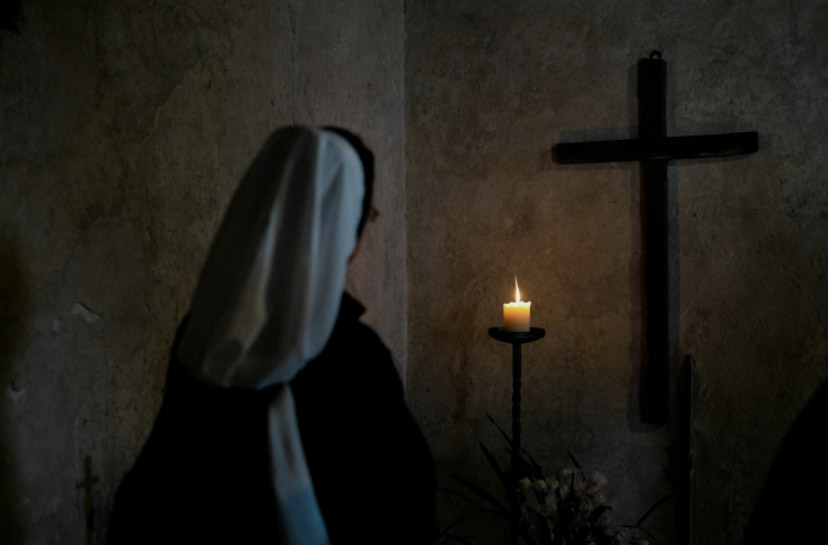by Gill O’Halloran
The day Maeve told me she was leaving to become a nun I vomited. We’d been friends since primary school. When the bullying began in secondary school, Maeve was the one who pulled me through. We’d dated each other’s exes, got drunk on her dad’s homemade wine, danced in houses without doors, once even kissed each other ‘to see what it felt like’; Maeve said later that I’d made her, but it’s not true, it was her idea. We applied to different universities, but I gave up an offer from Cambridge to follow her to Birmingham, wrote half her finals’ papers when she was too sick to care. We’d been flatmates ever since. When we were older, we’d buy houses next door to each other, stop to lean over the fence, and moan about our husbands while we hung out the washing.
We were atheists. Not woolly agnostics. Out and proud heathens. But during the pandemic, God slipped in the back door when I wasn’t watching. When Maeve’s mum nearly died she’d prayed; she said it helped. I said nothing, imagined it a one-off. But it wasn’t. Maeve came back to the flat one night, told me she’d been going to the local church, had bought a bible. I pulled a face. There had to be more, she said, she was searching. A month later she announced she’d had a calling from God; it came to her in a dream. God’s plan for her lay in a Benedictine abbey on the South coast and she was moving out in two weeks to become a nun. I turned to the sink, vomited. Maeve thought it was disgust, but that wasn’t why. I felt her warm hand on my back, heard her say she barely understood it herself, but she trusted God’s intent. You’re running away, I said, you must be unhappy, do you feel ugly? She smiled. No, she’d never felt happier, more beautiful, and she hoped I’d be happy for her too even if this were something I could never, ever, understand.
“Try me,” I said, standing my hot cup on her illustrated bible, watching her wince as the tea stain spread out from Jesus’s head like a dulled halo. But I didn’t want to understand. The person who left a week later was not Maeve. Not my sparkle-girl. When she moved the final items out of her bedroom I shoved my grief into the spaces left on the shelves and shut the door.
Two months on, as the summer waned, she invited me to come and visit her one evening; to take supper with her and her sisters. Which is how I came to be standing here at the gate of the convent, peering through the iron railings.
Wisps of Vespers drift over to me on the feather of an evening breeze. And then, as they exit the chapel, I see my girl, her slight form enveloped in the beneficent sisters that surround her. Her robes are loose on her like her body’s gone on holiday. Red hair aside, she’s identical to the other black-robed figures, weaving down the winding path towards the gate, a murmuration of nuns silhouetted against an apricot sky. They pause, stand in a circle on the lawn, hold hands. They’re laughing. I didn’t know nuns laughed. Maeve’s not seen me, doesn’t know I’m here.
In my pockets I’ve stashed treats, things she’ll be missing: a compact mirror, her favourite Charlotte Tilbury Love Bite lipstick, a bottle of Hendrick’s gin. But suddenly I know she hasn’t missed them, that she’ll say the Lord doesn’t want her to have these tokens, these trifles. She’ll press them back into my shallow pockets with some godawful homily: bless you, Shona, you know not what you do.
I force my clenched throat open, pour her gin down it, pout into the mirror, coat my lips with her lipstick. I call her name again. This time she hears me, walks towards the gate, puts her fingers through the railings to touch my face.
“Slag,” I say.
“I forgive your anger,” she looks me in the eyes. I can’t look back at her.
“You’re an ugly bitch without make-up!” I try.
“You’re beautiful with or without it, Shonie.”
“Selfish cow, I gave up my degree for you.”
“And I’m forever in your debt.”
I want to fall on my knees, say I’d do it all again, I thought we’d always be together, say I miss you; I love you.
“Fuckwit.”
She grins, sticks her tongue out. “When you come inside, maybe you could leave your rudeness outside with your shoes?” she says. “Supper’s ready, all the vegetables are from the garden. C’mon, the Lord says always offer a place at the table for a prodigal daughter.” She opens the gate, and I fall onto her, all the seething greedy need of me collapsing in her arms. She holds my hand, my bride of Christ, and we take the path towards the abbey.
“Come into the house of God,” she says. And I do.

Gill’s poetry book ‘This Seven-Year-Old Walks Into a Bar’ was published in 2009. She loves running poetry workshops but has only recently discovered the thrill of squeezing small stories into tight spaces. Find her in Bath Flash Fiction Anthology 2024, Trash Cat Lit, Underbelly Press. As her mum would say, “I’m a girl like you, just a bit older.”


